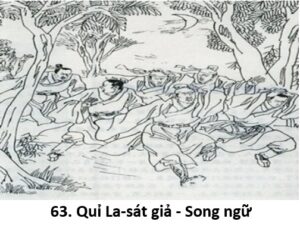63. Quỉ La-sát giả – An Actor Wearing A Demon’s Garment – Song ngữ
Sakyamuni’s One Hundred Fables
Kinh Bách Dụ
English: Tetcheng Liao
Việt ngữ: Hòa Thượng Thích Tâm Châu
Compile: Lotus group

63.An Actor Wearing A Demon’s Garment – Quỉ La-sát giả
Once upon a time, there was a troupe of actors from Cadhara Kingdom, rambling in different parts of the country giving performances due to a famine. They passed the Pala New Mountain where evil demons and men-eater Raksas had been found.
Xưa nước Càn-đà-vệ (Gandhàra) có bọn con hát nhân thời đói kém họ rủ nhau đi sang nước khác kiếm ăn. Đi qua núi Bà-la-tân là núi có rất nhiều quỉ dữ La-sát ăn thịt người.
The troupe had to lodge in the mountain where it was windy and cold. They slept with the fire on. One of them who were chilly wore Raksa demon’s costume and sat near the fire when another actor awoke and saw him. He ran away without looking closely at him. In general panic, the whole troupe got up and ran away. The one who wore the Raksa garment, not realizing what was happening, followed them. – Seeing he was behind them, all the actors got more frightened to do them harm. They crossed rivers and mountains, and jumped into ditches and gullies. All got wounded in addition to the great fear they suffered. They did not realize that he was not a demon until daybreak.
Bọn con hát tới đây tối phải ngủ đêm dưới chân núi, gió rét đốt lửa sưởi. Trong bọn con hát ấy có một người rét quá không ngủ được, mới dậy lục rương áo trò, lấy cái áo mang hình quỉ La-sát mặc vào, ngồi trông vào đống lửa, sưởi ấm. Có một người ngủ tỉnh dậy trông ra đống lửa thấy quỉ La-sát ngồi sưởi, sợ quá, không xét-nét ra sao vùng dậy chạy, làm kinh-động cả những người đang ngủ; những người đang ngủ cũng nhổ dậy chạy hết. Người mặc áo quỉ La-sát không hiểu sao cũng chạy theo sau. Những người đồng-hành thấy quỉ La-sát theo sau cho là nó muốn làm hại mình càng sợ, chạy vượt qua sông, núi, trụt ngã cả xuống hang-hố, thân-thể sây-sát, mỏi-mệt quá và, mãi đến sáng mới biết là không phải quỉ!
So are all the common people. Those who happen to be in the midst of the misfortune of famine, do not spare themselves trouble to go far away to seek for the sublime teaching of the Four Transcendental Realities of Nirvana, namely eternity, bliss, personality and purity. However, they cling to their egos which are nothing more than five components of a human being. Because of this, they are flowing back again and again through transmigration. Pursued by temptation, they are out of sorts in falling into the ditch of the Three Evil Paths. Only when the night of transmigration is ended, does the wisdom appear once again. Also, only at this moment can one perceive the five components of a human being have no real ego.
Phàm-phu cũng thế, ở trong phiền-não đói-thiếu thiện-pháp, muốn đi xa tìm thực-pháp vô-thượng: thường, lạc, ngã, tịnh nhưng, đối với tấm thân ngũ-uẩn này chấp càn là “có ta”, vì “ngã kiến” (tư-tưởng chấp cái ta) nên phải lăn-lộn trong sinh-tử, bị phiền-não đuổi theo không được tự-tại, sa rơi vào hang-hố của ba đường ác: địa-ngục, ngã-quỉ, súc-sinh. “Đến sáng” dụ cho đêm sinh-tử đã hết, ánh-sáng trí-tuệ tỏ-lộ mới biết ngũ-uẩn không có chân-ngã.
Sources:
Tài liệu tham khảo:
- http://www.buddhism.org/Sutras/2/FablesSutra.htm
- https://tienvnguyen.net/a615/kinh-bach-du-sakyamuni-s-one-hundred-fables
- https://phatphapungdung.com/phap-bao/kinh-bach-du-thich-tam-chau-dich-113682.html/3
- https://daitangkinh.net/?f=Kinh-Bach-Du/3
